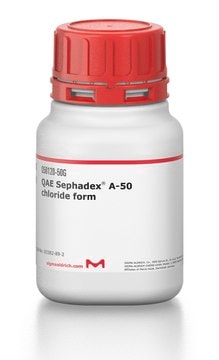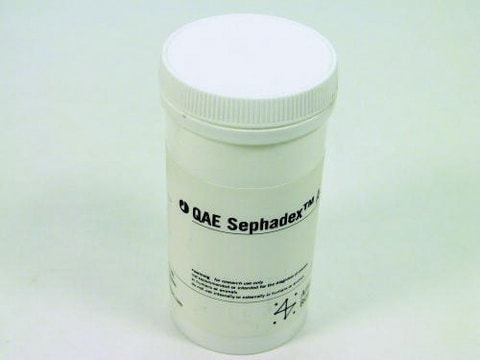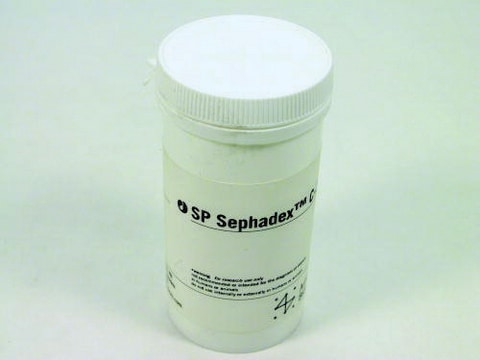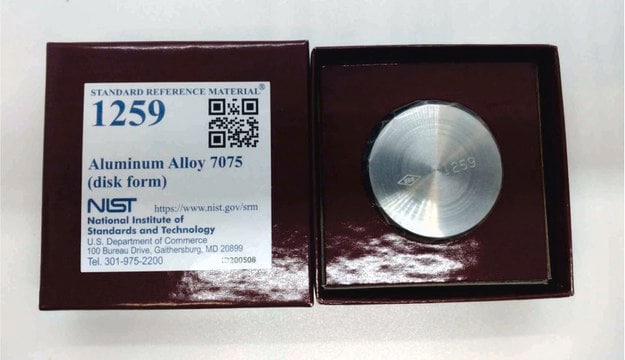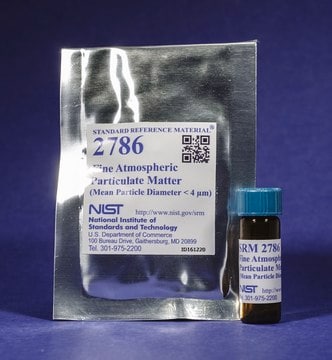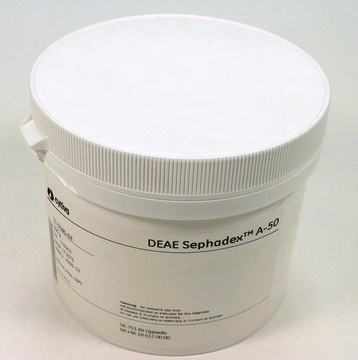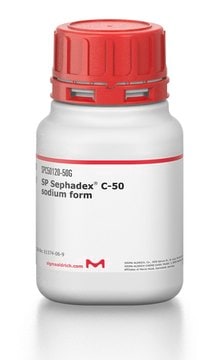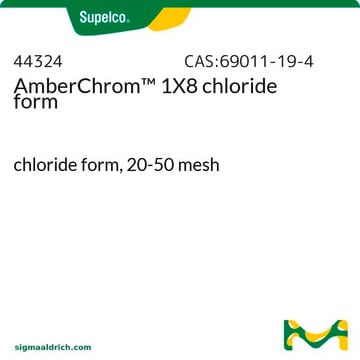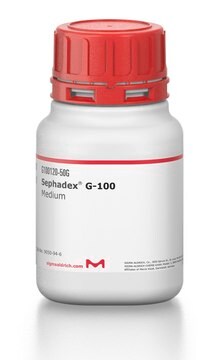Q25120
QAE Sephadex® A-25 chloride form
Synonym(s):
Diethyl-(2-hydroxypropyl)aminoethyl Sephadex®
Sign Into View Organizational & Contract Pricing
All Photos(2)
About This Item
Recommended Products
bead size
40-125 μm (dry)
pore size
~30,000 Da exclusion limit
operating pH
2-10
capacity
2.6-3.4 meq/g ion exchange capacity
compatibility
mode of use strong anion exchange chromatography
General description
Q25120-100G′s updated product number is GE17-0190-01
Application
QAE Sephadex® is used in protein chromatography, ion exchange chromatography, anion exchange media, resins and separation media. QAE Sephadex® has been used to develop methods to detect copper in water samples, resveratrol in beer, and indomethacin in both pharmaceuticals and urine samples.
Legal Information
Sephadex is a registered trademark of Cytiva
replaced by
Product No.
Description
Pricing
Storage Class Code
11 - Combustible Solids
WGK
WGK 3
Flash Point(F)
Not applicable
Flash Point(C)
Not applicable
Personal Protective Equipment
dust mask type N95 (US), Eyeshields, Gloves
Certificates of Analysis (COA)
Search for Certificates of Analysis (COA) by entering the products Lot/Batch Number. Lot and Batch Numbers can be found on a product’s label following the words ‘Lot’ or ‘Batch’.
Already Own This Product?
Find documentation for the products that you have recently purchased in the Document Library.
Customers Also Viewed
A B Cantor et al.
The Journal of biological chemistry, 267(32), 23349-23356 (1992-11-15)
Cathepsin D is a bilobed lysosomal aspartyl protease that contains one Asn-linked oligosaccharide/lobe. Each lobe also contains protein determinants that serve as recognition domains for binding of UDP-GlcNAc:lysosomal enzyme N-acetylglucosamine-1-phosphotransferase, the first enzyme in the biosynthesis of the mannose 6-phosphate
3-deoxy-d-manno-2-octulosonic acid (KDO) is a component of rhamnogalacturonan II, a pectic polysaccharide in the primary cell walls of plants.
York, W.S., et al.
Carbohydrate Research, 138(1), 109-126 (1985)
Purification and Partial Characterization of Host-Specific Toxins Produced by <I>Periconia circinata</I>.
Wolpert, T.J., and Dunkle, L.D.
Phytopathology, 70, 872-876 (1980)
A Varki et al.
Archives of biochemistry and biophysics, 222(1), 145-149 (1983-04-01)
An enzyme that is capable of removing the outer N-acetylglucosamine residues from phosphodiesters present on the high-mannose-type oligosaccharides of newly synthesized lysosomal enzymes has been described. This enzyme has been called an alpha-N-acetylglucosaminylphosphodiesterase, based upon its substrate specificity and on
Heterogeneous Reaction of Shattercane to <I>Periconia circinata</I> and its Host-Specific Toxin.
Dunkle, L.D.
Phytopathology, 69, 260-262 (1979)
Our team of scientists has experience in all areas of research including Life Science, Material Science, Chemical Synthesis, Chromatography, Analytical and many others.
Contact Technical Service
